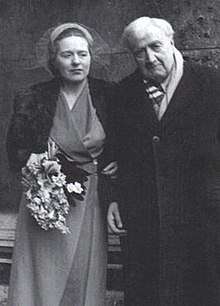Ursula Vaughan Williams
Joan Ursula Penton Vaughan Williams (née Lock; 15 March 1911 – 23 October 2007) was an English poet and author, and biographer of her second husband, the composer Ralph Vaughan Williams.
Ursula Vaughan Williams | |
|---|---|
 Ursula and Ralph Vaughan Williams on their wedding day in 1953 | |
| Born | Joan Ursula Penton Lock 15 March 1911 |
| Died | 23 October 2007 (aged 96) London, England |
| Occupation | Poet and author |
Biography
Born in Valletta, Malta, the daughter of Major-General Sir Robert Lock and his wife Kathleen Beryl Penton, daughter of Arthur Pole Penton CB, CMG, CVO, she began writing poetry in 1921. In 1941, her first published book of poems appeared, No Other Choice. Her second volume of poetry was Fall of Leaf, from 1943.[1]
In the early 1930s, she was a student at the Old Vic. In 1933 she married Michael Forrester Wood, an army officer. She met Ralph Vaughan Williams in 1938, after she sent him a play which she had hoped he would set to music. The meeting led eventually to their collaboration on the choral work Epithalamion. She and Vaughan Williams began an affair whilst still married to their respective spouses. Michael Wood died in 1942 whilst on Army duty, of a heart attack.[2] After his death, Ursula Wood continued her relationship with Vaughan Williams, with the acknowledgement of Vaughan Williams' wife Adeline, an invalid who was crippled by arthritis, and for whom Ursula was the carer. Ursula Wood became Ralph's literary advisor and personal assistant.
Adeline Vaughan Williams died in 1951. Ursula Wood and Ralph Vaughan Williams married in February 1953. She encouraged her husband to resume the composition he had been forced to set aside during his first wife's illness, writing the libretto to two of his last choral works, including the cantata for Christmas Hodie.[3] Ralph Vaughan Williams died in 1958. Following his death, Ursula Vaughan Williams set up residence in Gloucester Crescent near Regent's Park, London.[4]
In 1964, she published RVW: A Biography of Ralph Vaughan Williams. She completed her autobiography, Paradise Remembered, in 1972, but did not publish the book until 2002.[5] Additionally, she published four novels, including Set to Partners (1968) and The Yellow Dress (1984),[6] and five volumes of poetry. She provided libretti for other composers, including Herbert Howells, Malcolm Williamson and Elisabeth Lutyens, for example, her famous "Hymn to St. Cecilia", which was put to music by Howells.
Vaughan Williams lived for many years in Gloucester Crescent near Camden Town, where her neighbours included Alan Bennett and David Gentleman. She appears as a character in Bennett's autobiographical play and film The Lady in the Van, where she is played by Frances de la Tour.[7][8]
Until her death in London at age 96, she was honorary president of the Ralph Vaughan Williams Society. She was also the president of the English Folk Dance and Song Society. Her funeral was held at St John's Wood Church.[9]
Bibliography
- The Complete Poems of Ursula Vaughan Williams
- There was a time... A pictorial journey from the collection of Ursula Vaughan Williams
- Paradise Remembered (autobiography)
- The Collected Poems of Ursula Vaughan Williams
References
- "Ursula Vaughan Williams (obituary)". Daily Telegraph. 25 October 2007. Retrieved 29 October 2007.
- "CWGC, Wood, John Michael James". Retrieved 20 July 2013.
- "Ursula Vaughan Williams (obituary)". The Times. 25 October 2007. Retrieved 24 July 2007.
- Letter from Ursula Vaughan Williams to Alan Bush – Letter No.: VWL3696 – The Letters of Ralph Vaughan Williams database
- Oliver Neighbour (25 October 2007). "Obituary: Ursula Vaughan Williams". The Guardian. Retrieved 29 October 2007.
- Robert Ponsonby (25 October 2007). "Obituary: Ursula Vaughan Williams". The Independent. Retrieved 29 October 2007.
- "Alan Bennett's Diary: The Lady in the Van". The Guardian. 14 November 2015. Retrieved 27 October 2016.
- Carrier, Dan (19 November 2015). "The Lady in the Van: the complete edition. By Alan Bennett". Camden Review. Retrieved 27 October 2016.
- Carrier, Dan (8 November 2007). "Hundreds pay tribute to Vaughan Williams". Camden New Journal. Retrieved 25 December 2016.